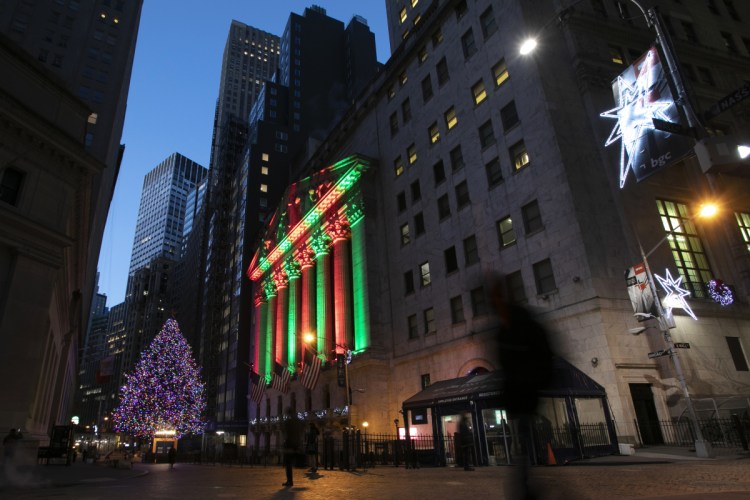NEW YORK – Stocks went into another slide Thursday in what is shaping up as the worst December on Wall Street since the depths of the Great Depression, with prices dragged down by rising fears of a recession somewhere on the horizon.
The Dow Jones Industrial Average dropped 464 points, bringing its losses to more than 1,700 since last Friday. The broader S&P 500 index continued its slump, too, and is down 10.6 percent this month alone, with six days of trading to go.
“This is the classic shoot-first-and-ask-questions-later market,” said Scott Wren, senior global equity strategist at Wells Fargo Investment Institute.
Stocks usually end the year with a flourish, and December is usually the best month of the year for the market. But this month has been dismal. Without a decent rally, this could be the worst December since 1931.
The S&P 500 is almost 16 percent below the peak it reached in late September. It is on track for its biggest one-month loss since February 2009 and its first losing year in a decade. (The index took tiny losses in 2011 and 2015 but ended those years higher once dividends were included.)
Likewise, the technology-heavy Nasdaq composite is down 19.5 percent from the record high it reached in August.
Investors are growing worried that global economic growth is cooling off and that the U.S. could slip into a recession in the next few years.
The market swoon is coming even as the U.S. economy is on track to expand this year at the fastest pace in 13 years. Markets tend to move, however, on what investors anticipate will happen further out.
The possibility of a partial shutdown of the federal government at midnight Friday also loomed over the market. In general, shutdowns don’t affect the U.S. economy or the market much unless they stretch out for several weeks, but investors don’t like uncertainty, especially in Washington.
Among other threats: the trade dispute between the U.S. and China, and rising U.S. interest rates, which act as a brake on economic growth by making it more expensive for businesses and individuals to borrow money.
The selling in the last two days came after the Federal Reserve raised interest rates for the fourth time this year and signaled it was likely to continue raising rates next year.
Wren said investors felt Fed Chairman Jerome Powell came off as unconcerned about the state of the U.S. economy and fears that the economy could not just slow down, as expected, but go into a recession in 2019 or 2020.
Treasury Secretary Steven Mnuchin told Fox Business on Thursday afternoon that the market’s reaction to the Fed was “completely overblown.”
The S&P 500 index skidded 39.54 points, or 1.6 percent, to 2,467.42. The Dow fell 464.06 points, or 2 percent, to 22,859.60 after sinking as much as 679 during the day.
The Nasdaq fell 108.42 points, or 1.6 percent, to 6,528.41. The Russell 2000 index of smaller companies dropped 23.23 points, or 1.7 percent, to 1,326.
Oil prices continued to retreat. Benchmark U.S. crude fell 4.8 percent to $45.88 a barrel in New York, and it has dropped 40 percent since early October.
After early gains, bond prices headed lower. The yield on the two-year Treasury rose to 2.87 percent from 2.65 percent, while the 10-year note rose to 2.80 percent from 2.77 percent.
The stock markets in France, Germany, Britain, Italy, Portugal, Spain, Tokyo and Hong Kong also fell.
AP Economics Writer Josh Boak contributed to this story from Washington.
Send questions/comments to the editors.



Success. Please wait for the page to reload. If the page does not reload within 5 seconds, please refresh the page.
Enter your email and password to access comments.
Hi, to comment on stories you must . This profile is in addition to your subscription and website login.
Already have a commenting profile? .
Invalid username/password.
Please check your email to confirm and complete your registration.
Only subscribers are eligible to post comments. Please subscribe or login first for digital access. Here’s why.
Use the form below to reset your password. When you've submitted your account email, we will send an email with a reset code.